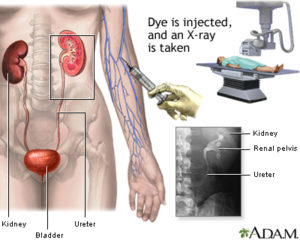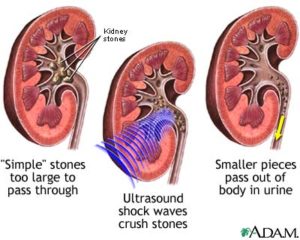Kidney stones |
||
DefinitionA kidney stone is a solid mass made up of tiny crystals. One or more stones can be in the kidney or ureter at the same time. Alternative NamesRenal calculi; Nephrolithiasis; Stones – kidney; Calcium oxalate – stones; Cystine – stones; Struvite – stones; Uric acid – stones; Urinary lithiasis CausesKidney stones are common. Some types run in families. They often occur in premature infants. There are different types of kidney stones. The cause of the problem depends on the type of stone. Stones can form when urine contains too much of certain substances that form crystals. These crystals can develop into stones over weeks or months.
Calcium stones can also form from combining with phosphate or carbonate. Other types of stones include:
The biggest risk factor for kidney stones is not drinking enough fluids. Kidney stones are more likely to occur if you make less than 1 liter (32 ounces) of urine a day. SymptomsYou may not have symptoms until the stones move down the tubes (ureters) through which urine empties into your bladder. When this happens, the stones can block the flow of urine out of the kidneys. The main symptom is severe pain that starts and stops suddenly:
Other symptoms can include:
Exams and TestsThe health care provider will perform a physical exam. The belly area (abdomen) or back might feel sore. Tests that may be done include:
Stones or a blockage can be seen on:
TreatmentTreatment depends on the type of stone and the severity of your symptoms. Kidney stones that are small most often pass through your system on their own.
Some people with severe pain from kidney stones need to stay in the hospital. You may need to get fluids through a vein. For some types of stones, your provider may prescribe medicine to prevent stones from forming or help break down and remove the material that is causing the stone. These medicines can include:
Surgery is often needed if:
Today, most treatments are much less invasive than in the past.
Talk to your provider about what treatment options may work for you. You will need to take self-care steps. Which steps you take depend on the type of stone you have, but they may include:
Outlook (Prognosis)Kidney stones are painful but most of the time can be removed from the body without causing lasting damage. Kidney stones often come back. This occurs more often if the cause is not found and treated. You are at risk for:
Possible ComplicationsComplication of kidney stones may include the obstruction of the ureter (acute unilateral obstructive uropathy). When to Contact a Medical ProfessionalCall your provider if you have symptoms of a kidney stone:
If you have been diagnosed with blockage from a stone, passage must be confirmed either by capture in a strainer during urination or by follow-up x-ray. PreventionIf you have a history of stones:
ReferencesBushinsky DA. Nephrolithiasis. In: Goldman L, Schafer AI, eds. Goldman’s Cecil Medicine. 25th ed. Philadelphia, PA: Elsevier Saunders; 2016:chap 126. Fink HA, Wilt TJ, Eidman KE, et al. Medical management to prevent recurrent nephrolithiasis in adults: a systematic review for an American College of Physicians Clinical Guideline. Ann Intern Med. 2013;158(7):535-543. PMID: 23546565 www.ncbi.nlm.nih.gov/pubmed/23546565. Fink HA, Wilt TJ, Eidman KE, et al. Recurrent nephrolithiasis in adults: comparative effectiveness of preventive medical strategies [Internet]. Rockville, MD. Agency for Healthcare Research and Quality (US) 2012; Report No.: 12-EHC049-EF. PMID: 22896859 www.ncbi.nlm.nih.gov/pubmed/22896859. Lipkin ME, Ferrandino MN, Preminger Glenn M. Evaluation and medical management of urinary lithiasis. In: Wein AJ, Kavoussi LR, Partin AW, Peters CA, eds. Campbell-Walsh Urology. 11th ed. Philadelphia, PA: Elsevier; 2016:chap 52. Qaseem A, Dallas P, Forciea MA, Starkey M, Denberg TD; Clinical Guidelines Committee of the American College of Physicians. Dietary and pharmacologic management to prevent recurrent nephrolithiasis in adults: a clinical practice guideline from the American College of Physicians. Ann Intern Med. 2014;161(9):659-667. PMID: 25364887 www.ncbi.nlm.nih.gov/pubmed/25364887. |


